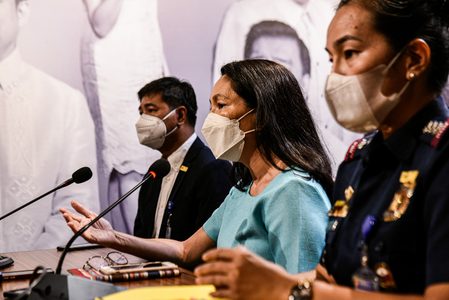SUMMARY
This is AI generated summarization, which may have errors. For context, always refer to the full article.
![[OPINION] Asserting PH sovereignty against commercial sexual exploitation of children](https://www.rappler.com/tachyon/2022/10/tl-child-abuse.jpg)
On October 24, the United States Department of Justice announced that Dean Edward Cheves pleaded guilty of sexual exploitation of children in the Philippines. Cheves admitted that he met some Filipina minors over the internet while serving as the first secretary at the US embassy in Manila from 2017 to 2021. The US Justice Department reports:
“From December 2020 to March 2021, Cheves communicated online with a then 15- to 16-year-old Philippine minor, who he paid to produce and send to him sexually explicit images of the minor. Additionally, in February 2021, Cheves engaged in sex acts on two separate occasions with a second 16-year-old Philippine minor who he met online, using his government-issued cellphone to film himself doing so on at least one of those occasions. The child sex abuse material that Cheves produced and received of these minors were found on devices seized from Cheves’s embassy residence in the Philippines. Cheves knew the ages of both minors at the time he engaged in the conduct.”
Cheves’ case is just one of the many indications of commercial sexual exploitation of children (CSEC) and online sexual exploitation of children (OSEC) happening in the Philippines. As a country suffering from serious poverty problems with a growing number of children in conflict with existing laws, CSEC and OSEC regrettably occur because of predatory individuals preying on the vulnerability of children.
Cheves’ case gets greater attention as it involves an American diplomat sexually preying on vulnerable Filipina girls, but it is not the first time that a diplomat has gotten involved in an inappropriate sexual conduct in the Philippines. In 2014, Daniele Bosio, then Italian Ambassador of Turkmenistan, was arrested in the Philippines for sexual abuse and trafficking of children aging 9, 10, and 12 years old. Involvements of foreign diplomats in child sex abuse have also been happening for a long time. Peter Hayman, a British diplomat who served as High Commissioner to Canada, was reported to have engaged in sexual perversion of children in the 1960s. In 1996, then Australian Prime Minister Alexander Downer raised the alarm that some Australian diplomats posted in Asia were involved in commercial sexual exploitation of children. In 2017, the US recalled a Vatican diplomat for sexually abusing minors.
The Philippines as a destination for “sex tourism” became the subject of a controversial statement of an American diplomat. Then US Ambassador Harry Thomas Jr. remarked in 2011 that 40% of male tourists visited the Philippines for sex. He apologized for making this careless comment after a strong popular condemnation. But his insensitive comment indicated what was originally on his mind as a diplomat.
According to Plan International Philippines, CSEC and OSEC remain to be significant problems in the Philippines. Thus, it underscores the urgent need for the Philippine government to improve its current efforts at fighting human trafficking and child exploitation by “expanding the availability and quality of protection and assistance for victims, strengthening preventive efforts and expanding their reach, and addressing the backlog of trafficking cases in courts.”
Unfortunately, Cheves was not tried in Philippine courts. He was prosecuted in the US federal grand jury in Virginia. Cheves was charged there for a count of illicit sexual activity in the Philippines involving a 16-year-old girl.
Based on Cheves’ and other related cases, it is imperative for the Philippine government to assert Philippine sovereignty against the growing cases of diplomats engaged in CSEC and OSEC. As part of its diplomacy, the Department of Foreign Affairs (DFA) needs not only to actively implement Republic Act 11930 or the “Anti-Online Sexual Abuse or Exploitation of Children (OSAEC) and Anti-Child Sexual Abuse or Exploitation Materials (CSAEM) Act” that lapsed into a law on July 30, 2022. The DFA and related Philippine authorities also need to pursue decisive diplomacy with foreign counterparts about the importance of prosecuting offenders in the Philippines. As a sovereign act, the Philippine government needs to assert the obligation of diplomats to respect the law and regulations of the host state.
To uphold justice to the victim and to assert Philippine sovereignty, there is a strong call for Cheves to be extradited to the Philippines as he intentionally violated in Philippine territories existing laws, specifically the Philippine Child Abuse Law and the Anti-Child Pornography Act. The US supports the implementation of these laws as part of its Project Safe Childhood and campaign against sex trafficking.
The Pasay City Regional Trial Court already ordered his arrest in August 2021. This legal action is an expression of Philippine sovereignty. Cheves who already admitted the crime he committed against the Filipino people had been urged to face justice in the Philippines. As aptly stressed by former justice secretary Menardo Guevarra who is currently the Solicitor General of the Philippines, Cheves is “accountable not only under US laws but more so under the laws of the Philippines where he committed these horrible crimes.” – Rappler.com
Dr. Rommel C. Banlaoi is a political scientist, international studies scholar, and a national security expert. He is the President of the Philippine Society for Intelligence and Security Studies (PSISS) and Chairman of the Philippine Institute for Peace, Violence and Terrorism Research (PIPVTR). He also serves as the Vice Chairman for Internal Affairs of the Advisory Council of the Philippine Drug Enforcement Group (PDEG) of the Philippine National Police (PNP) and Vice Chairman for External Affairs of the Advisory Group of the PNP Criminal Investigation and Detection Group (CIDG).
Add a comment
How does this make you feel?

There are no comments yet. Add your comment to start the conversation.